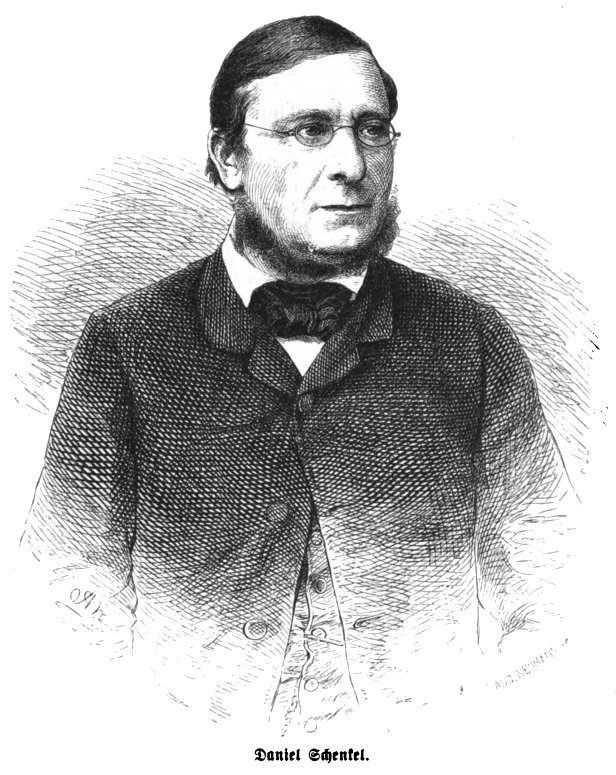Daniel Schenkel on:
[Wikipedia]
[Google]
[Amazon]
Daniel Schenkel (also known as: Georg Daniel Schenkel and Georg Daniel Schenkel von Waldkirch) (21 December 181318 May 1885) was a 
Swiss
Swiss may refer to:
* the adjectival form of Switzerland
* Swiss people
Places
* Swiss, Missouri
* Swiss, North Carolina
*Swiss, West Virginia
* Swiss, Wisconsin
Other uses
*Swiss-system tournament, in various games and sports
*Swiss Internation ...
Protestant
Protestantism is a Christian denomination, branch of Christianity that follows the theological tenets of the Reformation, Protestant Reformation, a movement that began seeking to reform the Catholic Church from within in the 16th century agai ...
theologian.

Biography
Schenkel was born atDägerlen
Dägerlen is a municipality in the district of Winterthur in the canton of Zürich in Switzerland.
History
Dägerlen is first mentioned in the 14th Century as ''Tegerlo''. During the 13th Century, Rutschwil (first mentioned in 1219 as ''Ruolts ...
in the canton of Zürich
The canton of Zürich (german: Kanton Zürich ; rm, Chantun Turitg; french: Canton de Zurich; it, Canton Zurigo) is a Swiss canton in the northeastern part of the country. With a population of (as of ), it is the most populous canton in the ...
. After studying at Basel
, french: link=no, Bâlois(e), it, Basilese
, neighboring_municipalities= Allschwil (BL), Hégenheim (FR-68), Binningen (BL), Birsfelden (BL), Bottmingen (BL), Huningue (FR-68), Münchenstein (BL), Muttenz (BL), Reinach (BL), Riehen (BS ...
and Göttingen
Göttingen (, , ; nds, Chöttingen) is a college town, university city in Lower Saxony, central Germany, the Capital (political), capital of Göttingen (district), the eponymous district. The River Leine runs through it. At the end of 2019, t ...
, he was successively pastor at Schaffhausen (1841), professor of theology at Basel (1849); and at Heidelberg
Heidelberg (; Palatine German language, Palatine German: ''Heidlberg'') is a city in the States of Germany, German state of Baden-Württemberg, situated on the river Neckar in south-west Germany. As of the 2016 census, its population was 159,914 ...
professor of theology (1851), director of the seminary and university preacher. At first inclined to conservatism, he afterwards became an exponent of the mediating theology (german: link=no, Vermittelungs-theologie), and ultimately a liberal theologian and advanced critic. This in turn cites:
* Herzog-Hauck, ''Realencyklopädie''
* Otto Pfleiderer, ''Development of Theology'' (1890)
* F. Lichtenberger, ''History of German Theology'' (1889)
Associating himself with the "German Protestant Union" (german: link=no, Deutsche Protestanten-verein), he defended the community's claim to autonomy, the cause of universal suffrage
Universal suffrage (also called universal franchise, general suffrage, and common suffrage of the common man) gives the right to vote to all adult citizens, regardless of wealth, income, gender, social status, race, ethnicity, or political stanc ...
in the church and the rights of the laity. From 1852 to 1859 he edited the ''Allgemeine Kirchenzeitung'', and from 1861 to 1872 the ''Allgemeine Kirchliche Zeitschrift'', which he had founded in 1859. In 1867, with a view to popularizing the researches and results of the Liberal school, he undertook the editorship of a ''Bibel-Lexicon'' (5 vols, 1869–1875), a work which was so much in advance of its time that it is still useful.
In his ''Das Wesen des Protestantismus aus den Quellen des Reformationszeitalters beleuchtet'' (3 vols. 1846–1851, 2nd ed. 1862), he declares that Protestantism is a principle which is always living and active, and not something which was realized once and for all in the past. He contends that the task of his age was to struggle against the Catholic
The Catholic Church, also known as the Roman Catholic Church, is the largest Christian church, with 1.3 billion baptized Catholics worldwide . It is among the world's oldest and largest international institutions, and has played a ...
principle which had infected Protestant theology and the church.
In his ''Christliche Dogmatik'' (2 vols, 1858–1859) he argues that the record of revelation is human and was historically conditioned: it can never be absolutely perfect; and that inspiration, though originating directly with God, is continued through human instrumentality. His ''Charakterbild Jesu'' (1864, 4th ed. 1873; Engl. trans. from 3rd ed., 1869), which appeared almost simultaneously with David Friedrich Strauss
David Friedrich Strauss (german: link=no, Strauß ; 27 January 1808 – 8 February 1874) was a German liberal Protestant theologian and writer, who influenced Christian Europe with his portrayal of the "historical Jesus", whose divine nature he ...
' ''Das Leben Jesu kritisch bearbeitet'' (Tübingen, 1835–1836), met with fierce opposition.
The work is considered too subjective and fanciful, the great fault of the author being that he lacks the impartiality of objective historical insight. Yet, as Pfleiderer says, the work "is full of a passionate enthusiasm for the character of Jesus." The author rejects all the miracles except those of healing, and these he explains psychologically. His main purpose was to modernize and reinterpret Christianity; he says in the preface to the third edition of the book: "I have written it solely in the service of evangelical truth, to win to the truth those especially who have been most unhappily alienated from the church and its interests, in a great measure through the fault of a reactionary party, blinded by hierarchical aims."
Schenkel died in Heidelberg.
Writings
He also wrote: *''Friedrich Schleiermacher: ein Lebens- und Charakterbild'' (1868) *''Christentum und Kirche'' (2 vols., 1867–1872) *''Die Grundlehren des Christentums aus dem Bewusstsein des Glaubens dargestellt'' (1877) *''Das Christusbild der Apostel and der nachapostolischen Zeit'' (1879)References
{{DEFAULTSORT:Schenkel, Daniel 1813 births 1885 deaths Swiss Protestant theologians Swiss Protestant ministers